Philippe Cousteau and the Next Generation of Water Stewards
About Philippe
Philippe Cousteau has established himself as a prominent leader in the environmental movement. An award winning television host, producer, author, speaker, philanthropist and social entrepreneur, Philippe is the son of Philippe Cousteau Sr. and grandson of Jacques Cousteau. His life-mission is to empower people to recognize their ability to change the world.
Philippe is the host and executive producer of Xploration Awesome Planet, a new series that airs every Saturday morning syndicated on Fox and then Sunday free on Hulu. As a special correspondent for CNN he has hosted several award-winning shows including Going Green and Expedition Sumatra.
In 2004 he founded EarthEcho International, a leading environmental education organization that is creating a whole new generation of environmental citizens - youth equipped with the knowledge to understand environmental challenges, critical thinking skills to solve them, and the motivation to do so.
>> Download full copy of Mission: Water Magazine
>> Download Voice of Water with Philippe Cousteau from Mission: Water Magazine
Question: Tying back to your family roots – what was it like growing up in a family of explorers?
Philippe: My father passed away six months before I was born. So, there was both inspiration and some tragedy from an early age, but thank goodness I had my grandfather and my mother there to support me.
My mother spent 13 years on expedition with my father. So, between the two of them, and my father's films and books, I was inspired. People may not remember, but [my father, Philippe Cousteau Sr.] filmed, produced, and directed 26 episodes of the series The Undersea World of Jacques Cousteau, which was popular at the time. He had his own award-winning series, Oasis in Space and was as much of a pioneer as my grandfather… he was the right hand to so much that [Jacques Cousteau] did. He led conservation efforts and was a global environmental advocate in his own right. So, I was in that environment growing up and it was a huge inspiration.
I always like to say first and foremost, I believe my father and grandfather both left behind a legacy of problem-solving. People think of my grandfather as this tall, lanky, Frenchman - as a global visionary, and leader in conservation, an explorer, a filmmaker, and all of these things, and he certainly was all of those. But for me, he was a problem-solver. When he started out as a young man, he had no ambition to explore the oceans.
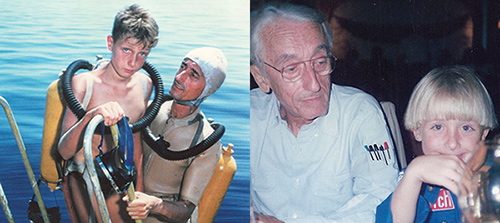
A young Philippe Cousteau Sr. with his father, Jacques (left) and a young Philippe Cousteau Jr. with his grandfather, Jacques-Yves Cousteau (right).
His goal and ambition, initially, was to fly with the Naval Aviation Program. Unfortunately, he broke his back in a car accident, which I like to call the most fortuitous or luckiest car accident in history – both for the world because it eventually changed history by setting him on a different course, but also for me because all of the remaining members of his Naval Aviation class were killed in the early days of World War II.
If it wasn't for that car accident, I literally wouldn't be here, so I'm grateful for it. And… the world would be a very different place because he was told to swim in the Mediterranean every day to rebuild his back strength.
He was struck by this [undersea] world that he saw and a friend gave him a pair of homemade goggles to use. Those weren’t things you could go down to the store and buy back then. And he used those goggles to start freediving and he became frustrated that he couldn't spend more time underwater.
Some people may forget the only way we could explore the oceans in the early 1900’s was through hard helmet diving that you see in the old Jules Verne movies…or through freediving. That was a problem [for Jacques] so he sought a way to solve it.
To make a long story short, he met an engineer and they coinvented scuba diving as we know it today. Then he wanted to figure out ways to film what he was seeing underwater to share the experience with others, so together they figured out ways to create underwater cameras. So, every step along the way, there was a problem that he sought to solve.
Eventually, over the course of a decade or more of diving and exploring the Mediterranean, he saw all of these aquatic environments for the first time and he was the first to show it to the world.
At this point in time, most people knew very little about the ocean. They only knew what we pulled out of it and ate, and the trash we'd dumped into it. Over the course of a decade or so, [my grandfather] witnessed a precipitous decline in the health of the environment.
In the Mediterranean, in particular, the population explosion post-World War II and corresponding trash, waste, and overfishing threatened the ocean. It was shocking.
His thinking evolved from exploring the oceans to recognizing he had a responsibility to protect them. So that's it...it's a long answer, but it kind of gives a little bit of context to our family’s thinking and how I grew up.
Question: At what point, as a kid, did you start to realize you were part of something bigger? Was there a turning point where you said, "I want my life to focus on advocating for the environment”?
Philippe: Yeah. Well, the best part of my job is that I'm able to travel, see the world, explore, and learn new things. And it really goes back to when I was about 16 years old and I had an opportunity to go on an expedition to Papua New Guinea.
I was in the southeastern part of the island, diving on a liveaboard with a researcher, Dr. Eugenie Clark, for two weeks. The trip was just spectacular. Here we were in this incredible, remote part of the world and we were doing research on a couple of new fish species that Eugenie had discovered. And I was thinking to myself, "My God, you can make a living doing this. You're traveling and you're seeing these amazing places why would I want to do anything else?"
That was the turning point for me. I was hooked.
Question: Once you started to show interest in that side of your family's life, did they encourage you to keep going?
Philippe: Well, my grandfather passed away when I was 17, a little less than a year after that experience in Papua New Guinea. And so he was certainly an important part of the inspiration leading up to that point, but by then it was my mother who encouraged me to keep moving forward in this world. She inspired me and pushed me forward to pursue my dreams.
We had family, friends and people who'd known my father and grandfather and they provided opportunities for me to start getting involved in research. But, I went off to university and it wasn't until I got out of school and moved to Florida to work with an oceanographic institution that I got back on this path. I knew I needed to do something to honor this legacy and that’s when EarthEcho was born.
Question: Tell me a little bit more about EarthEcho and how it's different from other environmental organizations.
Philippe: From its inception, EarthEcho was a response to a problem. I looked around at the environmental movement and realized there was already a duplication of effort. There were many groups out there focused on conservation. And, in many ways, we're not really a conservation organization. While that’s an essential tenet to EarthEcho, we're more of an environmental education organization.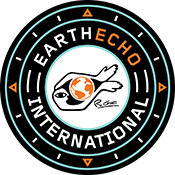
There were a lot of conservation groups out there doing good work, but few offered a strategy for youth. If you look at the big NGOs (non-government organizations) like the WWF or the Ocean Conservancy, they have virtually no youth strategy to speak of. And that was a problem for me and I recognized it was a need.
We don't like to duplicate effort, that's a very important part of the organization, and our philosophy, and our culture. Without a youth strategy, I don’t believe the environmental movement has a strategy.
My grandfather was a big proponent of young people and recognized they are truly the trendsetters of society and have tremendous influence on the corporate world and even their parents.
EarthEcho is unique because we leverage the history and the connection with the Cousteau legacy, but drive change by youth engagement.
>> Download full copy of Mission: Water Magazine
>> Download Voice of Water with Philippe Cousteau from Mission: Water Magazine
Question: Can you speak to how EarthEcho empowers youth specifically? And what strategies you've used to get more buy-in from the younger population?
Philippe: Yeah, we've evolved over the last 14 years, of course, just as technology and society has. I see organizations doing pretty much the same thing they were 30 years ago, and I think that that's an impediment to being effective.
It's hard to change. It's hard to grow and it's hard to look at new technologies. There weren't any smartphones 14 years ago when we founded EarthEcho. We've seen a huge evolution in society in how young people communicate, from video games to mobile devices. You have to keep up and look for new ways to engage with them.
Also, I think that what else sets us apart is that we're not a purely educational organization either. Our mission, our goal, is to engage people with action. We have a saying at EarthEcho, "awareness doesn't lead to action, action leads to awareness." We start with the idea of getting people engaged and getting them outdoors.
The EarthEcho Water Challenge is a perfect example of this. It's a program that we're really excited about. It was developed initially by the EPA around 15 years ago and has continued to evolve over the years. Other groups like the Water Environment Federation, WEF, took it over from the EPA for a couple of years and then they were seeking another partner that was more youth-focused to take over, and they chose us.
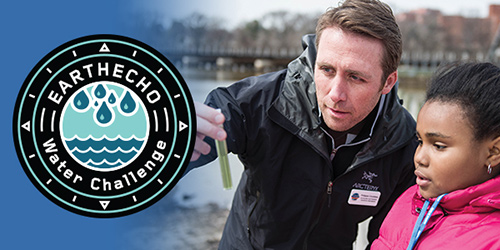
EarthEcho Water Challenge is the largest water quality program of its kind.
We were quite honored to be able to inherit that program two years ago, and it's a perfect example of action leading to awareness. We get people outdoors in their own communities, connecting with water, which is our most precious substance. They begin to understand where that water comes from and how it’s tested.
It’s the beginning of a powerful conversation, which is symbolic of what EarthEcho is all about. That conversation is a jumping off point to people thinking more critically about what's happening in the environment over the long-term.
Question: What’s your vision for the challenge moving forward?
Philippe: Well, as soon as we took over [the Water Challenge program], we spent a lot of time and resources updating the logistics of the program and how we could digitize and streamline how we communicate to participants. There was a lot of behind-the-scenes work and investment to bring us to where we are today. That continuous improvement is a big part of our strategy moving forward.
We also want to emphasize the action component of the challenge. Now that participants have personally tested the water and see the results, what are they going to do? Will they run cleanup projects, lobby for legislation, or seek funding? How will they improve or protect the water in their own community? There are all sorts of different ways that people can get involved.
Also worth mentioning, is expanding the different water quality parameters that we can test for. We're hearing back from many of our partners that the tests we have currently are a terrific starting point, but they're interested in collecting data on phosphates and nitrogen.
But why stop there? Can we look at nutrient loads in a water system that have a huge impact on our water? Eventually, could we build a program to test for things like E.coli and other indicators of water health?
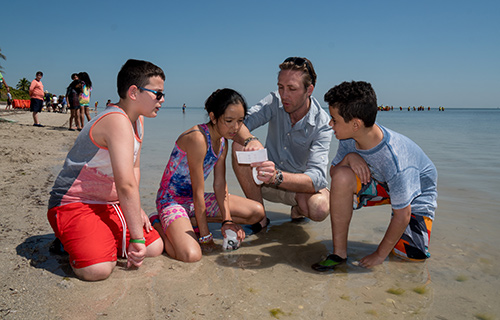
"Without a youth strategy, I don't think the environmental movement has a strategy."
Ultimately, our goal is to make the EarthEcho Water Challenge the premiere water quality program, and I believe in many ways it already is. It's the largest global program of its kind, but we're never satisfied. We want to continue to grow it to meet the diverse needs of each community around the world.
Question: What lessons have you learned from both your grandfather and father to fuel the work you do today?
Philippe: One very important lesson is that tenacity is a virtue. Most people read the glorious headlines and saw all the accomplishments of my grandfather; all the films, and the success stories, and all his other projects. What you don't hear about are the struggles; how difficult it was to raise money for a nonprofit to do films and to do all the hard work that went into them. There were constant challenges he had to overcome, but he made it look easy.
Growing up with those stories, I recognized early on that you can’t give up when things get difficult. Just a few years ago, the financial crisis took the rug out from under everyone. Yet, nonprofits didn't get a bailout, even though the nonprofit industry [in the U.S] is the backbone of our society and employs more people than financial services and auto industries combined.
It was a difficult time. When the economy suffers, charity suffers. Overcoming those types of challenges – many of which you have no control over, but threaten everything you've built – are a key to success.
Question: How do you think your television shows and outreach in the media have affected your conservation efforts and helped further your mission?
Philippe: In the media space, we have an opportunity to continue to be outside and involved in fieldwork. As an advocate for sustainability and the environment, it's really important to get out and into the thick of it. You can't be an armchair conservationist.
To speak to an issue and be passionate about it, you have to see it, touch it, and feel it, in person. The filmmaking and other related work allows me to do that, while also providing the added benefit of providing a platform to share those stories and experiences with millions.
We have many different shows and programs and they're all designed to inspire people, to engage them, and to keep them asking questions about the world around them. To honor this legacy and that’s when EarthEcho was born.
Check out Philippe's upcoming TV shows on FOX, Hulu, and the Travel Network
Xploration Awesome Planet, Season 4
Each week Philippe hosts a 30-minute riveting earth science documentary series that explores the 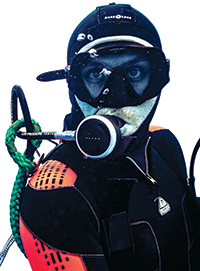 most spectacular places – on the earth, inside the earth, and above the earth.
most spectacular places – on the earth, inside the earth, and above the earth.
> Saturday Mornings, FOX (Seasons 1-3 Available on Hulu)
Caribbean Pirate Treasure
Later this summer, join Philippe and Ashlan as they dive into maritime mysteries, explore pirate history and investigate the lore of lost treasures in the Caribbean.
> Season 1 Premiers August 20th at 10:00pm, Travel Channel
Question: Has there been a moment or a special experience during your filming that stands out above all others?
Philippe: A big part of what we do is connecting the dots. We help people understand that human beings are intimately connected to the environment. My father and grandfather always said, "You can't build environmental sustainability without human sustainability."
There are so many different things that come to mind, but one that really impacted me was in Haiti. I was doing a special for CNN and for 10 days we examined local communities and how they were transforming themselves with hopeful and engaging work around solving the problems that they faced there, which are myriad and daunting, to say the least.
One community, in particular, was in a place called Cité Soleil, which in French, means the City of Sun. It's the largest slum in the western hemisphere, located in Port-au-Prince. There are a few hundred thousand people living there in a shantytown of shacks and tents, dealing with extreme poverty, pollution, crime, gangs, etc.
And in the middle of this, in the middle of this place, there's a program called The Jaden Tap Tap (Like thier Facebook Page), which is a beautiful community garden. The gentleman who started this program, created an oasis – a Garden of Eden – in the middle of this port. His purpose is to help kids and community members grow fresh vegetables, so they can get proper nutrition with healthy food. He also built a place where kids could come and play soccer (football) in a safe place, away from gangs. It was truly a paradise in the middle of one of the worst slums in the world.
That moment reminded me that connecting people to nature, particularly young people, can transform lives. It was an impactful experience to see people striving amidst truly daunting circumstances.
Question: What is your advice for young people thinking about following in your footsteps as a conservationist?
Philippe: No matter what you're interested in, ask questions, and always be interested and engaged in the world around you. Remain open-minded and inclusive because that allows you to learn, grow, and to change your opinion. I think that's one of the big problems we face today. People are so rigid in their ideology and thinking that they're unwilling to engage with others that don't necessarily share their views.
My other practical advice is to study communications. I always tell young people that – whether you want to become a doctor, scientist, an explorer, or a lumberjack – through the course of your education you should understand how to better communicate with people.
Take a public speaking class. Take a class in communications because those are the types of tools that will last a lifetime, and they're practical skills that a lot of young people today aren't getting. I was just speaking with some kids studying marine biology, and while it's great to have all that information and all that knowledge, if you can't talk to people about your work, it doesn't do the world much good.
You have to be able to communicate to people, and you have to be able to get others excited about your work, or else you’ll just be piling away a research paper up on the shelf somewhere in the library, which should not be the goal.
Firing people up about these issues should always be the goal.
